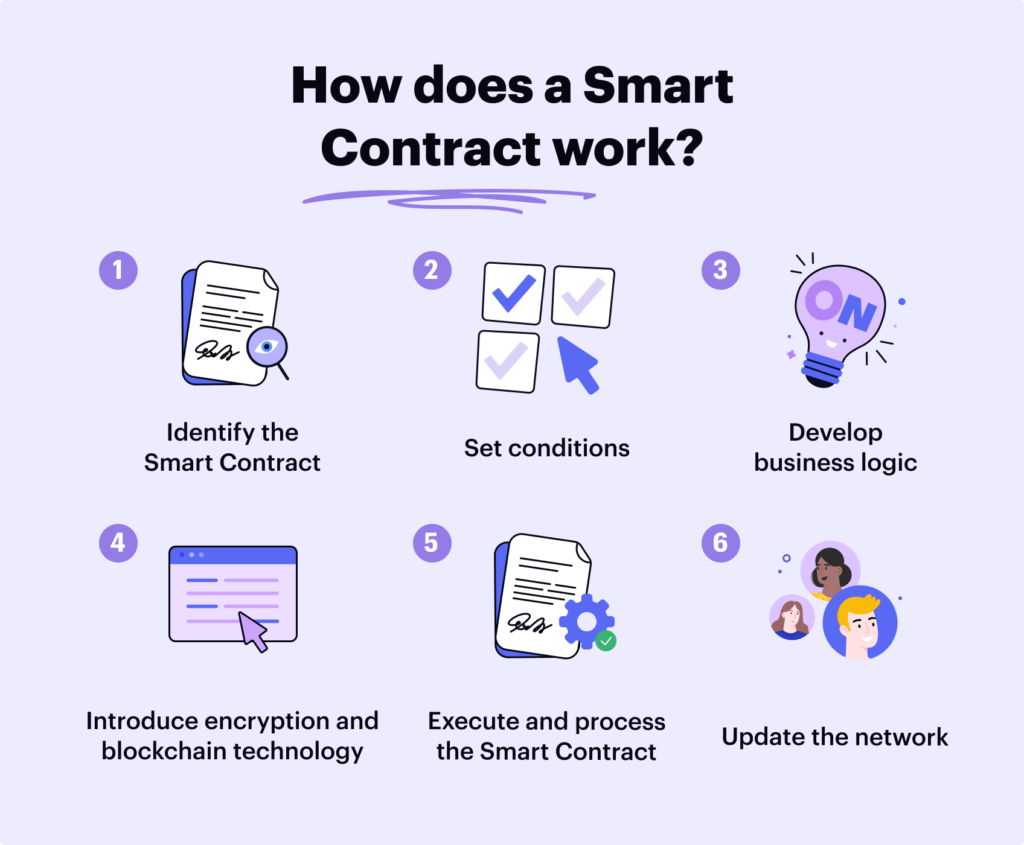
Smart Contracts — the digital revolution in legal agreements. The term popularized by Ethereum founder, Vitalik Buterin, smart contracts are self-executing, programmable, and resistant to tampering.
Understanding Smart Contracts
Smart contracts are essentially programs that run specifically on a blockchain. They have rules and conditions encoded in them, which ensure the contract is automatically executed if met by involved parties.
Smart contracts differ from regular contract management – they’re used for automating transactions and facilitating direct agreements between users. For example, Ethereum allows developers to deploy their own smart contracts using its platform, and to run them, you can buy Ethereum coins (ETH).
Per stats, “The smart contracts market revenue by the end of 2021 was US $150.2 Million. The smart contracts market is expected to reach US$ 1,515.4 Million by 2032, growing at a CAGR of 23.5% from 2022 to 2032”.
From banking to real estate, smart contracts have the potential to transform countless industries when integrated into their processes.
Key Features of Smart Contracts
In this section, let us explore the main features that make smart contracts stand out and why they hold such immense potential for widespread use.
1. Security
Smart contracts implement advanced cryptography to secure the information and agreements within them. This makes it exceptionally hard for unauthorized parties to tamper with or corrupt the contract’s data.
2. Decentralization
By operating on a blockchain, smart contracts are inherently decentralized. The control and validation of transactions are dispersed and managed by numerous nodes in the blockchain network, eliminating single points of failure.
3. Transparency
While maintaining the confidentiality of sensitive data, smart contracts provide a transparent view of transactions on the blockchain. This enhances trust between involved parties and creates a clear audit trail.
4. Efficiency and Speed
Smart contracts automate and streamline various processes that would otherwise be time-consuming and require numerous intermediaries. As a result, transactions and agreements are executed more efficiently and at a faster pace than with traditional contracts.
5. Cost Reduction
Owing to automation and the removal of middlemen, smart contracts significantly cut down transaction costs, administrative fees, and other expenses that would be associated with the traditional contract landscape.
6. Accuracy
Smart contracts minimize the risk of human error by encoding the terms and conditions in a computerized, programmable format. This precision ensures that contractual agreements are executed accurately without misunderstandings or disputes.
7. Customizability
Despite having a foundational structure, smart contracts can still be customized to suit the unique needs of different parties and industries. This flexibility allows for a wide range of use cases and adapts to specific requirements and regulations.
Potential Use Cases for Smart Contracts
Given the numerous benefits of smart contracts, they can effectively transform various industries and sectors. Here are some promising use cases:
Insurance
Smart contracts can automate claim processes, making them more efficient and less prone to errors or fraud. Insured parties and insurers can securely share necessary data and trust the claims process due to the transparency provided by the blockchain.
For example, a smart contract could be programmed to release a payout to a policyholder if their flight is delayed by a predetermined number of hours. This would significantly reduce administrative efforts and disputes, leading to higher customer satisfaction.
Healthcare
Smart contracts can be used for managing and authorizing patient data access, orchestrating treatment plans, and streamlining medical billing processes. This can improve the overall efficiency and security of the healthcare system while ensuring patient privacy.
For example, a smart contract could be configured to grant access to a patient’s medical records only when specific conditions are met, such as the patient providing consent or the accessing party being a certified medical professional. This ensures the secure and controlled sharing of sensitive information.
Real Estate
Smart contracts can revolutionize the real estate industry by automating property transactions, lease agreements, and property registration. This can help eliminate fraud, streamline verification, and reduce the need for agents or brokers, making the entire process more efficient and affordable for all parties involved.
For example, a smart contract could be designed to automatically transfer property ownership once payment has been completed and all required documents have been submitted and verified. This would significantly speed up the buying and selling process, removing the need for costly intermediaries and paperwork.
Supply Chain Management
By leveraging smart contracts, supply chain relationships can be optimized, and the tracking of goods can be made more transparent and immutable. This not only improves trust among stakeholders but also helps with regulatory compliance, reduces counterfeits, and optimizes resource allocations.
For example, a smart contract could be implemented to enforce the payment of suppliers once the products have been received and validated, ensuring timely payment and fostering trust among supply chain partners.
Additionally, the contract can be programmed to update the product’s status when it undergoes specific checks throughout the supply chain, creating a transparent, verifiable audit trail and helping prevent counterfeit products.
Voting and Governance
The incorporation of smart contracts into voting systems can help ensure security, transparency, and verifiable results. Their use in governance will minimize tampering concerns, reduce administrative costs, and aid in the fair and efficient implementation of policies and regulations.
For example, a smart contract-based voting system could be designed to automatically tally votes and declare the results once the voting period has ended, ensuring a transparent and tamper-proof method of determining election outcomes.
Moreover, the system could securely store voters’ identities to prevent double-voting or fraud, saving resources on voter verification and monitoring.
Finance and Banking
Smart contracts can revolutionize the finance and banking industry by automating and streamlining various processes, such as loans, securities, and asset management. This can lead to faster transactions, reduced paperwork, increased security, and regulatory compliance, significantly enhancing the customer experience.
For example, a smart contract could be developed to automatically execute loan repayments based on predefined terms and schedules, ensuring accuracy and timeliness.
Smart contracts can facilitate faster and more secure financial transactions, including cross-border payments, securities trading, and lending. They can also be used for automated financial planning and smart investment solutions that leverage predefined logic and data-driven decision-making.
Intellectual Property Management
Artists, creators, and inventors can use smart contracts to protect their intellectual property, streamline royalty payments, and enforce licensing agreements. The transparency and immutability of blockchain technology will play a key role in preventing theft, assuring rightful ownership, and reducing IP conflicts.
For example, a smart contract could be designed to automatically distribute royalty payments to content creators every time their work is used or licensed, ensuring fair compensation and eliminating the need for manual calculations or third-party interventions.
Furthermore, the contract can also verify the authenticity of the work, confirming that the rightful owner is credited and protecting against unauthorized use or distribution.
IoT (Internet of Things)
Smart contracts can significantly enhance IoT operations by automating decision-making, data exchange, and asset management among connected devices. This can result in improved security, efficiency, and scalability for IoT networks, as well as enable innovative business models and value-added services.For example, a smart contract could be developed to coordinate and manage thousands of connected devices in a smart city, making decisions on data usage, device permissions, and energy consumption based on predefined conditions and real-time data. This would optimize resource allocation, ensure seamless connectivity between devices, and reduce energy consumption with a more eco-friendly approach.
Document workflow automation and Smart Contracts
Document workflow automation and smart contracts can work together to streamline and optimize business processes.
Smart contracts are self-executing contracts with the terms of the agreement between buyer and seller being directly written into lines of code. These contracts can automate the process of verifying and enforcing the terms of an agreement, without the need for intermediaries such as lawyers or notaries.
Document workflow automation, on the other hand, is the process of automating the routing, approval, and storage of documents within an organization. This technology can help organizations to streamline their processes, reduce errors, and increase efficiency.
When these two technologies are combined, they can enable organizations to automate the entire contract management process, from contract creation to execution and payment. For example, a smart contract can be used to automatically verify that all parties have fulfilled their obligations, while document workflow automation can ensure that all relevant parties have approved and signed off on the necessary documents.
This integration can help organizations to reduce the time and resources required for contract management, while also increasing accuracy and minimizing the risk of errors or disputes.
Challenges and Limitations of Smart Contracts
Despite their immense potential, smart contracts face several challenges and limitations that need to be addressed before they can achieve widespread adoption.
Scalability
As the number of smart contracts and users increases, the underlying blockchain networks must be capable of handling the increased volume of transactions. This requires addressing issues like network congestion, transaction costs, and energy consumption associated with blockchain systems.
Interoperability
There are various blockchain networks available with different protocols and consensus mechanisms. Smart contracts must be interoperable to enable seamless interaction and data exchange between these networks, ensuring a more efficient and fluid ecosystem for end-users.
Legal Recognition
To ensure the enforceability of smart contracts, they need to be recognized and upheld by legal systems across the globe. This might involve adjustments to current legal frameworks and a need for greater understanding and acceptance of blockchain technology among legislators and legal professionals.
Security and Privacy
While smart contracts offer great advantages in terms of transparency and immutability, they may also be subject to potential security risks and privacy concerns. Ensuring that coding practices are robust and secure is vital in order to limit exposure to vulnerabilities and protect sensitive data.
Tips to effectively implement Smart Contracts

To maximize the benefits of smart contracts and overcome their challenges, consider the following tips for effective implementation:
Identify the right use case
Focus on areas where smart contracts can add significant value, such as automating complex processes, reducing costs, or increasing security and transparency.
Choose the right blockchain platform
Select a blockchain platform that suits the specific requirements of your project, taking into consideration factors like scalability, interoperability, and flexibility.
Invest in developer education and training
Ensure your developers have a strong grasp of smart contract programming, including best practices for secure and efficient coding.
Test extensively
Thoroughly verify and audit your smart contracts to identify any vulnerabilities or issues before deployment. Consider enlisting the help of external auditors or security experts to further enhance the security of your contracts.
Integrate with existing systems
Work on solutions that enable seamless integration of smart contracts with your existing business processes and systems, facilitating a smooth transition and minimizing disruption.
Prioritize user experience
Develop user-friendly interfaces and documentation to encourage user adoption and make it easy for non-experts to engage with smart contracts.
Stay informed and engaged
Stay updated with industry developments and regulatory changes related to smart contracts and blockchain technology. Engage with the broader community to exchange ideas, knowledge, and best practices.
Consider legal implications
Work closely with experts to ensure that your smart contracts comply with applicable laws and regulations, and are legally enforceable in the jurisdictions in which they operate. Be prepared to adapt and adjust to evolving legal landscapes and emerging regulatory frameworks as and when required.
Don’t compromise on security and privacy
Implement strong security measures and privacy protocols to protect sensitive data and maintain the trust of all parties involved in transactions involving smart contracts.
Monitor performance and progress
Continuously monitor and analyze the performance of your smart contracts, looking for areas of improvement or optimization, to ensure they are meeting the desired goals and objectives.
Encourage collaboration
Work closely with other stakeholders, including partners, industry leaders, and regulators, to collaboratively address challenges, share solutions, and promote the responsible growth and adoption of smart contracts across various sectors.
Conclusion
Smart contracts hold great potential to transform numerous industries by automating processes, enhancing transparency, and improving efficiency. However, their widespread adoption comes with a set of challenges and limitations that need to be addressed effectively.
By identifying the right use cases, selecting suitable blockchain platforms, and focusing on factors such as security, privacy, user experience, and legal compliance, businesses and developers can work toward effectively implementing and harnessing the full potential of smart contracts.
Furthermore, staying abreast of advancements in blockchain technology, promoting education and training, and engaging with the broader community play a significant role in fostering a supportive environment for smart contracts’ growth and application.
